Alienware AW2725QF review: A versatile but mediocre monitor

 Image: Matthew Smith / Foundry
Image: Matthew Smith / FoundryAt a glance
Expert’s Rating
Pros
Excellent motion clarity at 360HzGreat sharpness at 4K resolutionAttractive design
Cons
Low contrast ratioModest color performanceNo USB-C video input
Our Verdict
The Alienware AW2725QF’s dual-resolution mode can offer 4K resolution at up to 180Hz, or 1080p at up to 360Hz. That makes the monitor more versatile, but mediocre image quality makes the monitor hard to recommend.
Best Prices Today: Alienware AW2725QF
RetailerPrice
There’s a new trend in gaming monitors: “dual-resolution” displays. These monitors advertise support for two resolutions with differing maximum refresh rates. The Alienware AW2725QF has a maximum resolution of 4K with a refresh rate up to 180Hz, but can also handle 1080p at up to 360Hz. That means the AW2725QF is a monitor that can deliver both excellent sharpness or top-tier motion clarity as required. However, the AW2725QF relies on an IPS panel without a Mini-LED backlight, which is bad news for its contrast and color performance.
Alienware AW2725QF specs and features
The AW2725QF’s specifications highlight its dual-resolution functionality. 4K resolution on a 27-inch monitor is the highest common resolution for Windows computers, as only a small handful of 5K monitors exists. However, when in 1080p resolution mode, the AW2725QF can achieve a refresh rate of 360Hz.
Display size: 27-inch ultrawide 16:9 aspect ratioNative resolution: 1920×1080 / 3840×2160 dual-modePanel type: IPSRefresh rate: Up to 360Hz at 1080p, up to 180Hz at 4KAdaptive sync: VESA Adaptive Sync, Nvidia G-Sync CompatibleHDR: VESA DisplayHDR 600 certifiedPorts: 2x HDMI 2.1, 1x DisplayPort 1.4, 1x USB-B 3.2 Gen 1 (upstream), 3x USB-A 3.2 Gen 1 (downstream), 1x USB-C 3.2 Gen 1 (downstream)VESA mount: 100x100mmSpeakers: NoPrice: $599.99 MSRP
Display panel aside, the monitor’s specifications are typical for the category. It supports HDR and Adaptive Sync and has three video inputs. It can also function as a USB hub with multiple downstream USB-A ports, though its range of USB functionality is not impressive, and it lacks a USB-C input with DisplayPort Alternate Mode.
Further reading: See our roundup of the best gaming monitors to learn about competing products.
Alienware AW2725QF design
The Alienware AW2725QF is immediately identifiable as an Alienware monitor, and that’s a positive. Alienware embraced its current retro sci-fi “Legend” design language in 2019, and it hasn’t looked back since. Though no longer novel, the AW2725QF’s swooping panels and attractive RGB-LED lighting deliver an eye-catching look.
It’s a well-built monitor, as well, with good material quality across the panel. With that said, though, new OLED monitors (including those from Alienware) are a step ahead of the AW2725QF. OLED monitors don’t require a backlight behind the display panel, so they’re much thinner at the edges. The AW2725QF does require a backlight, so it looks a bit bulky when compared to 27-inch OLED alternatives.
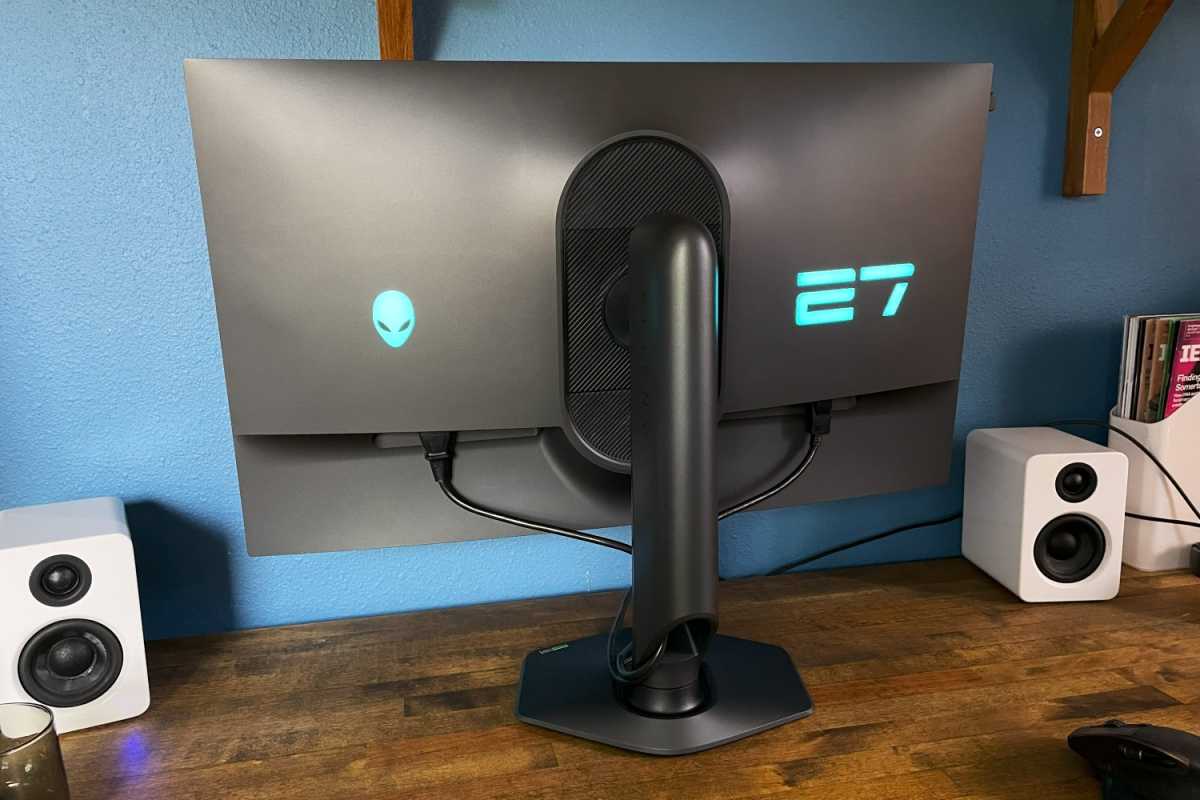

Matthew Smith / Foundry

Matthew Smith / Foundry
Matthew Smith / Foundry
The monitor ships with a sturdy stand that adjusts for height, tilt, pivot, and swivel. It has a small, hexagon-like base that doesn’t take up much room on a desk. It’s not entirely flat, but close to it, so some items can still be placed on the stand. That’s an advantage over competitors that use a wide, tripod-like stand, as the AW2725QF will fit comfortably on small desks. The monitor also has a 100x100mm VESA mount for use with third-party monitor arms and stands.
Alienware AW2725QF connectivity and menus
Alienware provides three video inputs for the AW2725QF: two HDMI 2.1 ports and one DisplayPort 1.4. All three video inputs can handle the monitor’s full refresh rate and resolution at both 1080p and 4K. There’s no USB-C with video input, however, so the monitor isn’t a great choice for connecting a laptop or tablet with USB-C. That’s a bit of a disadvantage in 2024, as some gaming monitors, like recent Gigabyte Aorus and MSI MPG models, have USB-C ports with DisplayPort Alternate Mode and USB Power Delivery.
The AW2725QF does offer some USB connectivity, which is driven by a USB-B upstream port. This includes three downstream USB-A ports and one USB-C port. The USB-C port does include power charging, but only up to 15 watts.
A joystick centered on the monitor’s low bezel provides access to Alienware’s on-screen menus. The joystick is responsive and the menus feel logically arranged — though, like many monitors, the font size is a bit smaller than would be ideal. I also noticed that the text of the menu did not contrast well with the dark background, as the text was a dark hue of gray instead of near white. This would be easy to fix in a firmware update, I think, and I’d encourage Alienware to do so, because I think many people will find the current menu system difficult to read.
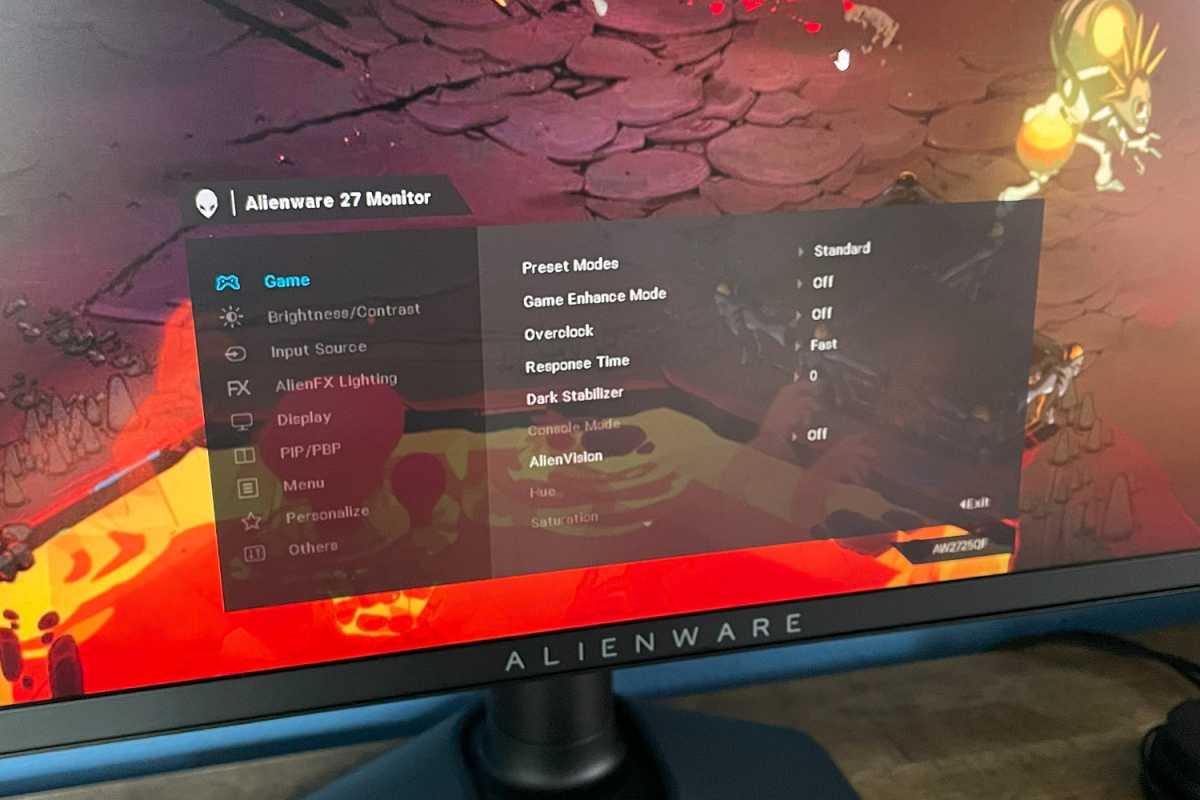

Matthew Smith / Foundry

Matthew Smith / Foundry
Matthew Smith / Foundry
The menus provide an acceptable but not outstanding range of adjustment. There’s a custom color mode, which includes adjustment for color hue, gain, saturation. However, the monitor does not have a standalone color temperature mode to target specific color temperature values. Also, both the sRGB color gamut mode and gamma adjustment controls are only accessible in the monitor’s “Creator” mode. A variety of gaming-centric features are available, too, such as a dark stabilizer to increase the brightness of dark areas of screen and on-screen timer and framerate counters.
The AW2725QF doesn’t include speakers, which is typical for a gaming monitor. Most don’t, and few that do provide passable audio quality. Strangely, though, the AW272QF also lacks a 3.5mm audio output. That means you can’t connect speakers or headphones to the monitor and must instead connect directly to the audio source, which might be inconvenient if you have multiple video inputs connected and frequently switch between them.
Alienware AW2725QF SDR image quality
I’ll be honest: The Alienware AW2725QF immediately struck me as a strange, and perhaps disappointing, monitor. 4K resolution at up to 180Hz looks sharp, and the dual-resolution versatility is appreciated, but in exchange the AW2725QF sticks with a conventional IPS display panel. This type of panel tends to offer a lower contrast ratio and (without Quantum Dots) a more limited color gamut than OLED competitors. Unfortunately, testing the AW2725QF revealed the limitations I expected, though the monitor does have some strengths.
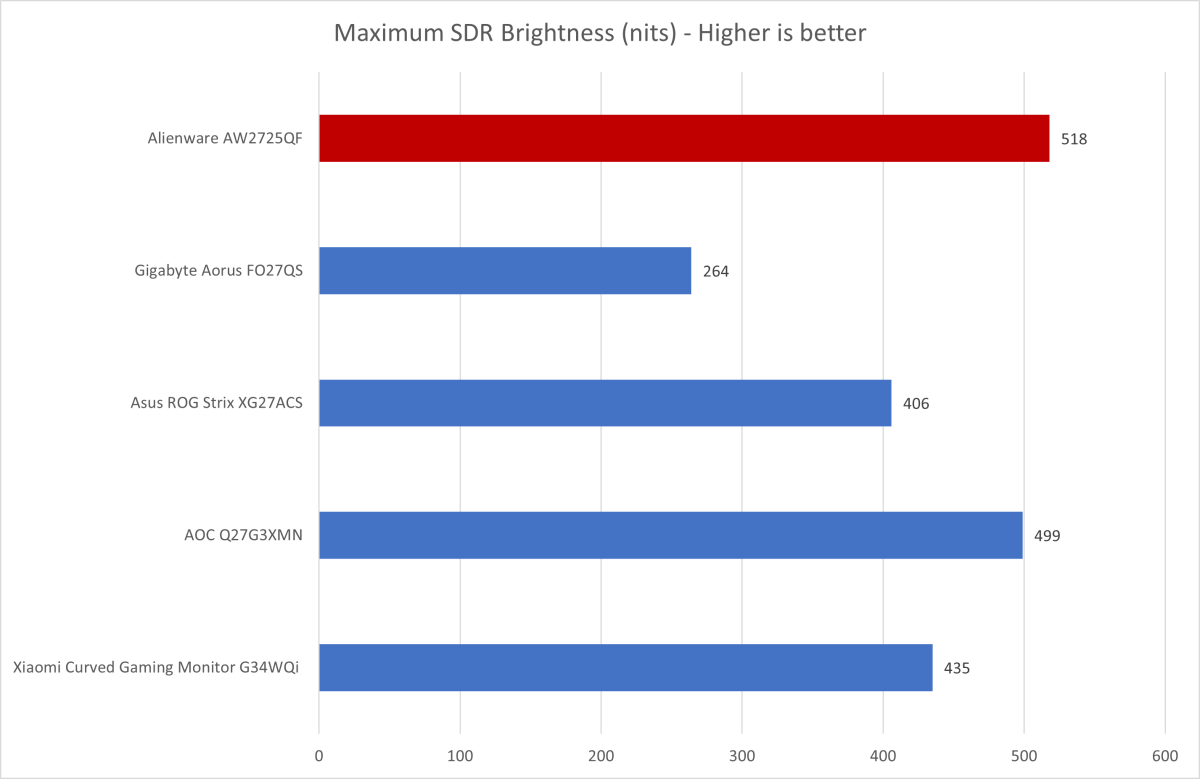

Matthew Smith / Foundry

Matthew Smith / Foundry
Matthew Smith / Foundry
Brightness is among those strengths. I measured a maximum SDR brightness of 518 nits, which is excellent for any monitor and way more than a typical gaming display. This level of brightness is excessive if you’re planning to game in a dim or dark room (and I usually used the monitor at 35 to 40 percent of its maximum brightness), but it’s good news if you want to use the monitor in a very bright room.
The monitor is brighter than its competitors, as well, and roughly twice as bright as the Gigabyte Aorus FO27QS, which has a QD-OLED panel.
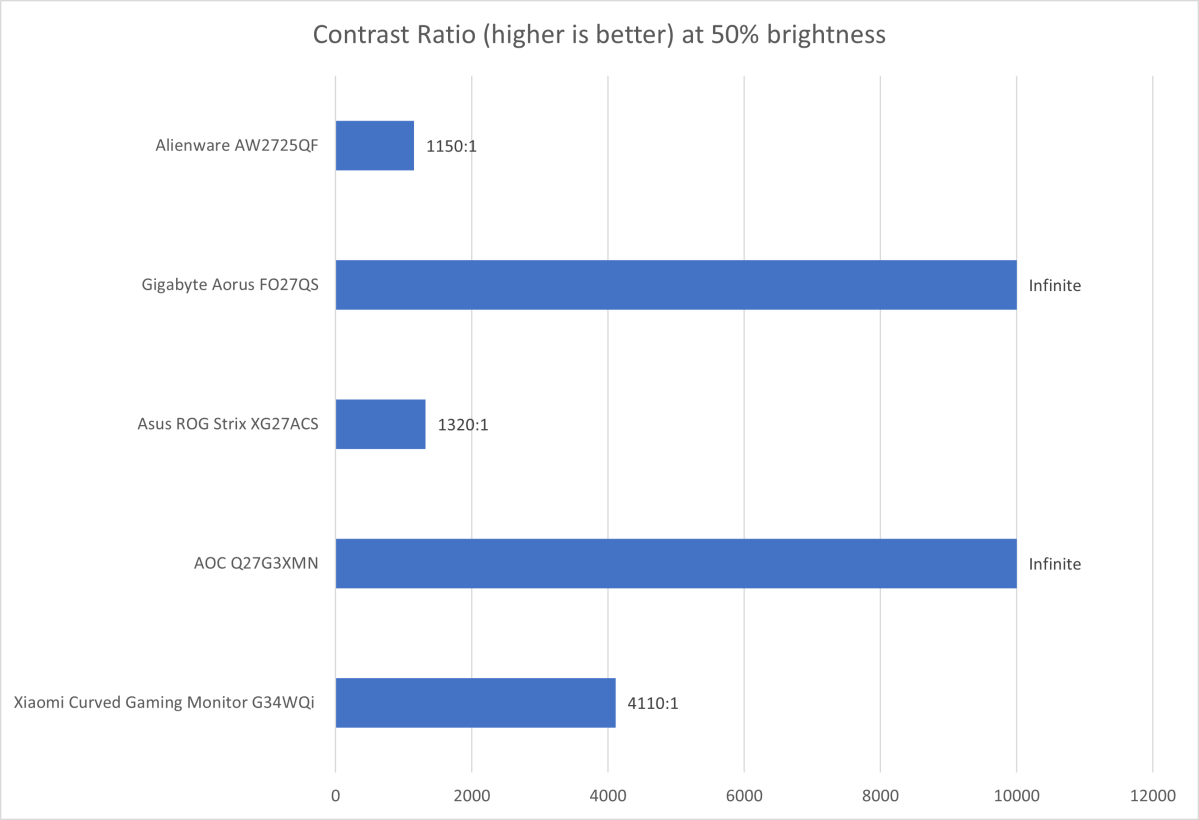

Matthew Smith / Foundry

Matthew Smith / Foundry
Matthew Smith / Foundry
Contrast completely changes the narrative, however, as the AW2725QF had a contrast ratio of just 1150:1. That’s the worst contrast ratio of the competitors I chose for comparison, falling behind even the Asus ROG Strix XG27ACS, which also had an IPS display panel.
The lack of contrast is an issue when viewing darker, more atmospheric games, movies, and photos in a dim or dark room. The dreaded “IPS glow” — a hazy silver-gray cast to dark scenes — is apparent. It also noticeably lacks uniformity, which only adds to the distraction. Whether this matters depends on what you use the monitor: It’s often not a major issue on the Windows desktop and in productivity apps, but a major downside in games and other entertainment.
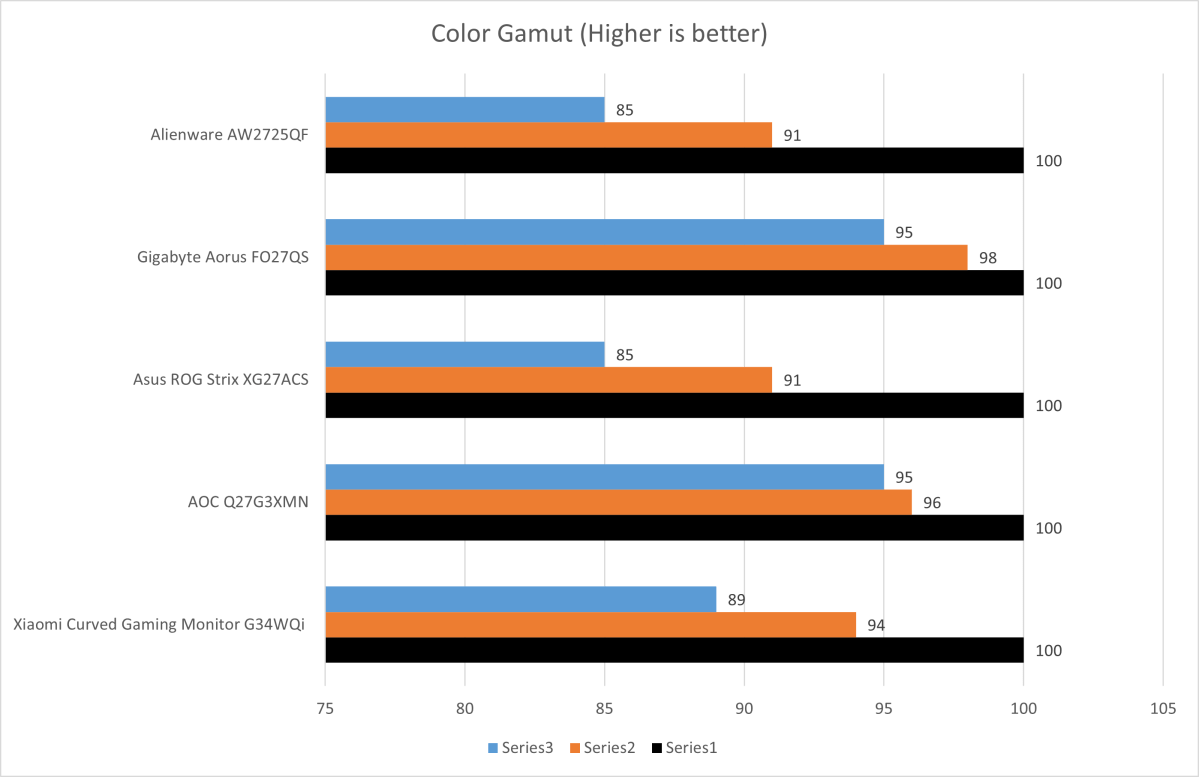

Matthew Smith / Foundry

Matthew Smith / Foundry
Matthew Smith / Foundry
It feels a bit odd to say the Alienware’s color gamut is limited, as a gamut like this would’ve been excellent five years ago. But times have changed, and many modern monitors offer a comparable, or better, color gamut.
Gamers don’t need to worry about this too much, as the AW2725QF’s color gamut is still more than adequate to deliver a vivid and saturated image. Colorful games tend to look bright, attractive, and punchy.
However, the color gamut might turn off content creators who want to create or edit digital art, photo, video, and other media, as the AW2725QF can’t display as many colors overall as some competitors can.
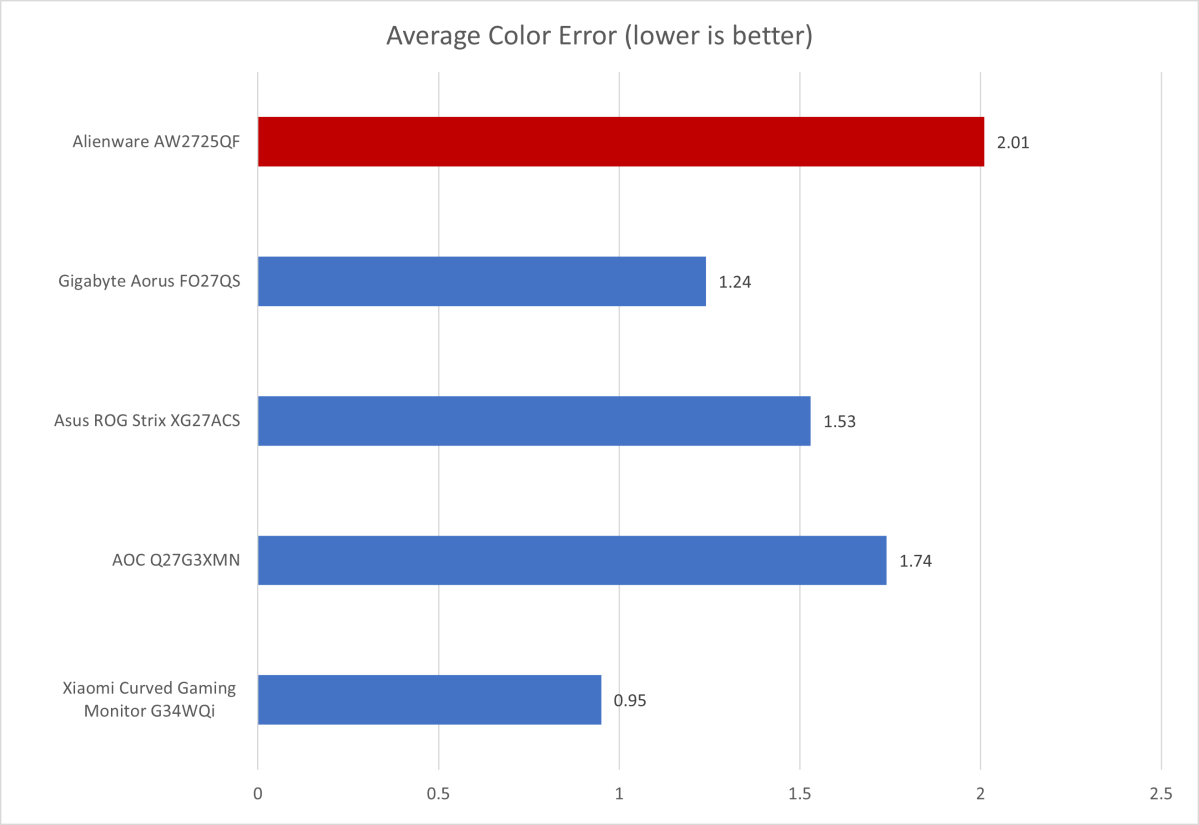

Matthew Smith / Foundry

Matthew Smith / Foundry
Matthew Smith / Foundry
Color accuracy is also a modest result. This level of color accuracy is still good, and I don’t think most people will see anything wrong, even when looking critically. Still, it’s clear that competitors have an edge in out-of-box color accuracy. All else being equal, that could lean some shoppers away from the AW2725QF.
However, while the AW2725QF didn’t have the best out-of-box color accuracy, it did well in color temperature and gamma tests. It had a default color temperature of 6500K and a gamma curve of 2.2. Both figures match our preference. In the real world, these numbers mean the AW2725QF’s image doesn’t look too warm or cool, and content is displayed with accurate luminance. Most monitors in this price range tend to be slightly off in at least one of these two metrics. OLED monitors, for example, often have a gamma result of 2.3, and look a bit darker and dimmer than I would prefer (though this can usually be corrected with the monitor’s on-screen menu options, which typically provide alternative gamma modes).
The Alienware AW2725QF is a rare miss for Dell’s gaming brand.
Sharpness is another highlight. The AW2725QF is a dual display monitor meant for use at 4K resolution up to 180Hz or 1080p resolution up to 360Hz. At 4K, the monitor provides excellent sharpness with a pixel density 163 pixels per inch. 27-inch OLED monitors are still stuck at 1440p resolution, so they won’t look as sharp as the AW2725QF.
One final point: While the AW2725QF has an anti-glare coating, it’s more of a semi-gloss finish than matte. Glare is diffused somewhat but can still appear rather concentrated at times. In general, I’m not a big fan of how this particular anti-glare finish looks; it seems like a poor compromise between matte and glossy.
Overall, the AW2725QF’s image quality is solid, but it seems like a bad match for its intended purpose. The monitor’s high brightness and excellent sharpness (at 4K resolution) make it a great monitor for productivity, but its low contrast ratio and modest color gamut make it less appealing for games and entertainment. That’s a problem, because the AW2725QF is meant to be a gaming monitor.
Alienware AW2725QF HDR image quality
The Alienware AW2725QF is VESA DisplayHDR 600 certified. That’s a notch above the entry-level VESA DisplayHDR 400 certification, but the AW2725QF isn’t a good HDR monitor.
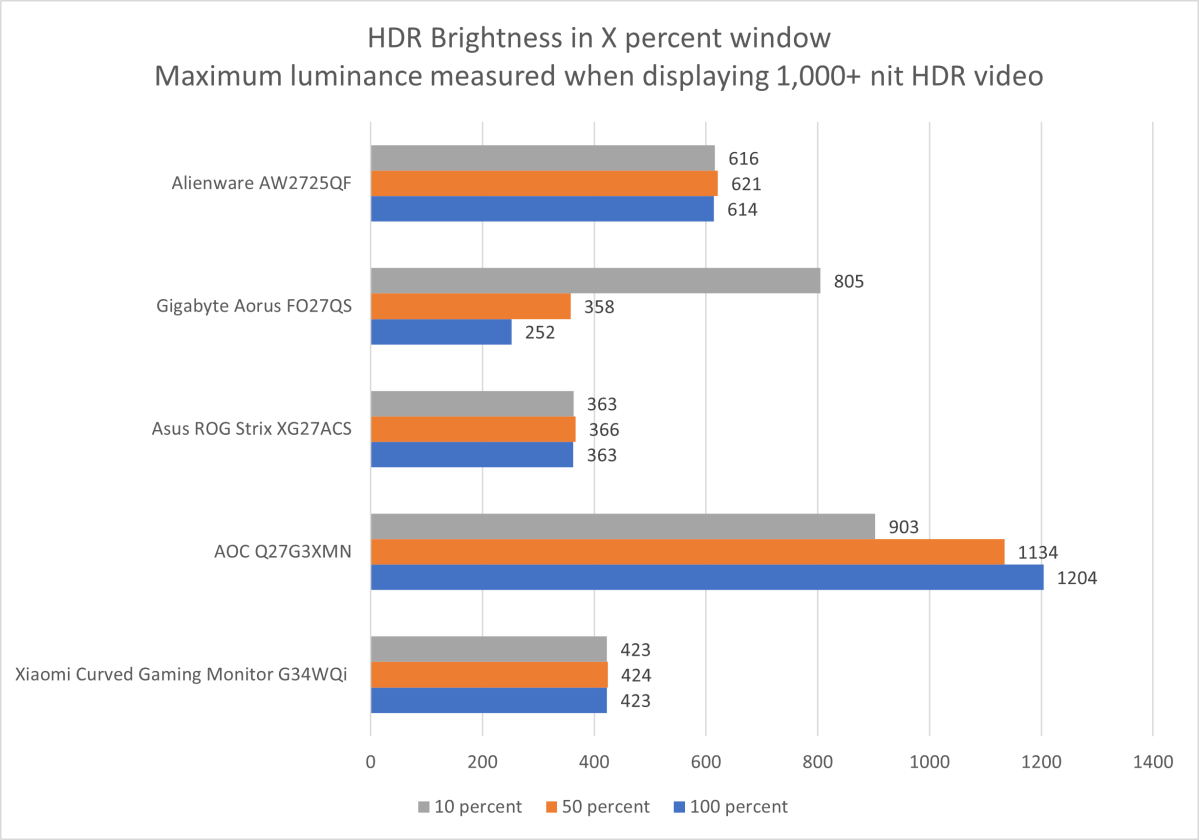

Matthew Smith / Foundry

Matthew Smith / Foundry
Matthew Smith / Foundry
I measured a maximum sustained full-screen HDR brightness of 614 nits. The monitor also reached a near-identical brightness of 616 nits in a 10 percent window, meaning just 10 percent of the display was active, while the rest was entirely dark. As the graph above shows, the AW2725QF has a higher full-screen HDR brightness than an OLED monitor, but falls behind the best OLED monitors in a 10 percent window. Mini-LED monitors, meanwhile, beat the AW2725QF in both areas.
Brightness aside, the AW2725QF’s contrast ratio remains a problem. As mentioned earlier, the monitor had a maximum contrast ratio of 1150:1 when at 50 percent of SDR brightness. That figure slightly worsens to a ratio of 1130:1 at maximum HDR brightness. The low contrast ratio means that dark areas of the screen suffer from elevated brightness, which compress luminance detail. Put more simply: The HDR image looks flat and dull.
This is not a surprise, given the AW2725QF’s IPS display panel, but it’s an issue. Both OLED and Mini-LED monitors can be purchased at a similar price, and both deliver much better HDR performance. The AW2725QF is a no-go for anyone who wants to watch HDR movies or play HDR games.
Alienware AW2725QF motion performance
Motion performance is arguably the reason to buy the AW2725QF. But, unlike some recent OLED monitors with refresh rates up to 360Hz, I’m not sure the argument holds up.
That’s not to say the AW2725QF’s motion clarity is bad. On the contrary, it’s excellent, and most owners are likely to be blown away by what they see. Games look clear and crisp even at 4K and up to 180Hz. At 1080p and 360Hz they look exceptionally detailed in motion. Only the smallest fonts and low-contrast UI elements are too blurred to make out.
The monitor’s dual-resolution feature has its uses, too. Gamers who want excellent motion clarity and low input lag in competitive games can obtain that from the 1080p/360Hz mode, but also have the option to switch to 4K/180Hz for better sharpness in single-player games. Also, it’s worth remembering that a high refresh rate is only useful when a game achieves a matching frame rate. Some games are incapable of a frame rate up to 360 frames per second, so opting for the 4K/180Hz mode makes more sense in those titles.
However, the AW2725QF faces stiff competition from OLED alternatives. Alienware’s own 360Hz QD-OLED monitors, the AW2725DF, is much more expensive at $899.99, but it’s often possible to find an alternative priced close to the AW2725QF. The MSI MPG 271QPX is currently $649.99 on Amazon, for example. Going OLED means you’ll have to trade a maximum resolution of 4K for 1440p, but I think most gamers will be happy to exchange that for OLED’s superior contrast and color performance.
Should you buy the Alienware AW2725QF?
The Alienware AW2725QF is a rare miss for Dell’s gaming brand. I can sort of see what Alienware was going for, as the AW2725QF’s dual-display capability and high refresh rate could appeal to competitive gamers. However, the rapid fall in OLED monitor pricing means that many models are just $50 to $100 more expensive, and some Mini-LED monitors also achieve similar pricing.
That makes the AW2725QF a tough sell, as it lacks the contrast, color gamut, and HDR performance of its competition. The AW2725QF is good for motion clarity, yes — but if you’re a gamer who spent over $1,000 to snag a video card capable of 4K at 180Hz or 1080p at 360Hz, I don’t think you’ll be happy with the SDR or HDR image quality this monitor can deliver.
Best Prices Today: Alienware AW2725QF
RetailerPrice
Author: Matthew S. Smith
Matthew S. Smith is a freelance technology journalist with 15 years of experience reviewing consumer electronics. In addition to PCWorld, his work can be found on Wired, Ars Technica, Digital Trends, Reviewed, IGN, and Lifewire. Matthew also covers AI and the metaverse for IEEE Spectrum and runs Computer Gaming Yesterday, a YouTube channel devoted to PC gaming history.
Recent stories by Matthew S. Smith:
Best home office monitors 2024: Displays that get the job doneBest monitors 2024: Gaming, 4K, HDR, and moreAsus ROG Swift PG27QDP review: A new high for motion clarity in monitors





